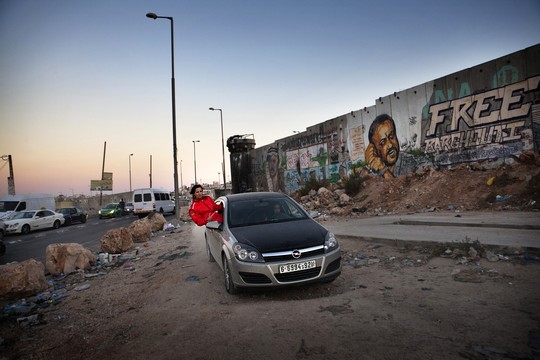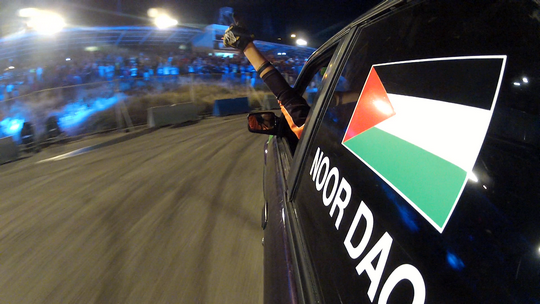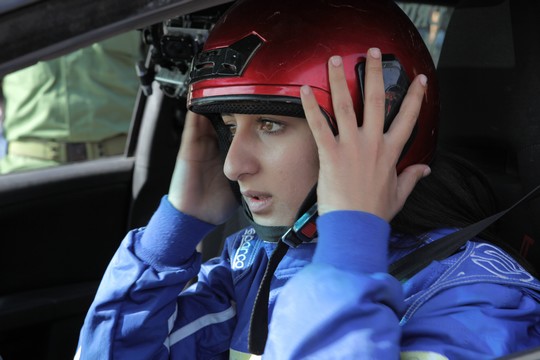A new documentary tells the story of five brave Palestinian female race-car drivers who must learn to challenge their own society’s norms while facing the violence of Israel’s military occupation.
That pursuit of something good, which fills you up with hope and positive energy, has become mission impossible even for optimists such as myself. Over the weekend I planned to watch a movie with a friend who suffers from “temporary depression” (such as myself), until our plot was foiled by a little thing called children and husbands. On Sunday we tried our best to head out to a stand-up comedy show, but in the end we decided we could just watch the Knesset Channel. And on Monday our plan to go to a spa was thrown away into the same dresser drawer as all the other socks and pairs of underwear that had just come out of the wash.
But that was before Haggai Matar told me that a new film titled “Speed Sisters” (“السابقات” in Arabic), had its Palestinian premier in Ramallah last Saturday. After two minutes of watching the trailer I knew I had to watch the movie. An unspeakable energy burst forth from the screen, where I saw five Palestinian women, dressed in rally clothing, large helmets with colorful race cars plastered with lightning-bolt stickers. I forced myself to get over my exhaustion and come back to life, lest my theories about women’s empowerment collapse upon themselves.
Speed Sisters is a documentary film that tells the captivating story of five exceptional Palestinian women who decided that cars, driving, speed, drifting, dirt, wheels and engines simply do it for them. Together they decided to form the first all-women automobile racing team in the occupied territories. Five young women sharing the same dream: to conquer a male-dominated world and speed forward, without restraints or checkpoints.
Marah Zahalka is the champion from Jenin refugee camp. Her grandfather is a refugee from Haifa, and her father is the invisible hero who supports her dream. He works 18-hour-days to support his family and help Marah soup up the car of her dreams. I loved his theory, according to which he won’t wait for the end of the occupation and the establishment of a Palestinian state — like he did when he was young — because his daughter needs to do what she wants with her life, and his role is to provide her with everything he can.
Betty Saadeh, a beautiful young woman who was born in Mexico and who identifies as a “Latina Palestinian, is dying to beat Marah’s record and win the title of champion. Mona Ennab, the first woman of the five to start racing, is torn between her search after love and a man who will move her, and the power of the engine. Throughout the movie she gets into two accidents, and yet continues to search. Noor Daoud, the wild child, is the brown-skinned sporty kind with a Jerusalem ID who breaks every gender stereotype that stands in her way. And Maysoon Jayyusi, the captain and coach of the team, who owns a store in Ramallah’s Clock Tower Square and is in love with a Jordanian-Palestinian man from the Hashemite Kingdom’s own rally team. Her love cannot come to her, and she finds it difficult to move her entire life to Amman.
These brave young women have no other place to train aside from the open area near Ofer Military Prison. For lack of any other option, and despite all the dangers, the women decide that they must start training in order to improve their stunts.
The film provides a compassionate and gentle view of the sisters. It integrates gender-related and social dilemmas, between sports and occupation, checkpoints and the restrictions on the freedom of movement. Between a career in the demanding world of male-dominated sports and love and family. Between making peace with life in the shadow of occupation and active resistance to it.
Speed Sisters is a brave film, one that is as complex as a rally car engine. The kind you need to drive in order to truly understand.
Director: Amber Fares. 80 minutes. In Arabic and English. Speed Sisters is currently being screened at film festivals around the world.
This article was first published in Hebrew on Local Call, where he/she is a blogger. Read it here.




